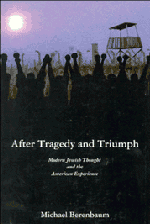Book contents
- Frontmatter
- Contents
- Foreword
- Introduction
- PART I THE HOLOCAUST IN CONTEMPORARY AMERICAN CULTURE
- PART II JEWISH THOUGHT AND MODERN HISTORY
- 8 Franz Rosenzweig and Martin Buber Reconsidered
- 9 The Problem of Pluralism in Contemporary Orthodoxy: Philosophy and Politics
- 10 From Auschwitz to Oslo: The Journey of Elie Wiesel
- 11 Jacob Neusner and the Renewal of an Ever-Dying People
- 12 Political Zionism's Would-Be Successors: Sectarianism, Messianism, Nationalism, and Secularism
- 13 The Situation of the American Jew
- Notes
- Index
12 - Political Zionism's Would-Be Successors: Sectarianism, Messianism, Nationalism, and Secularism
Published online by Cambridge University Press: 06 January 2010
- Frontmatter
- Contents
- Foreword
- Introduction
- PART I THE HOLOCAUST IN CONTEMPORARY AMERICAN CULTURE
- PART II JEWISH THOUGHT AND MODERN HISTORY
- 8 Franz Rosenzweig and Martin Buber Reconsidered
- 9 The Problem of Pluralism in Contemporary Orthodoxy: Philosophy and Politics
- 10 From Auschwitz to Oslo: The Journey of Elie Wiesel
- 11 Jacob Neusner and the Renewal of an Ever-Dying People
- 12 Political Zionism's Would-Be Successors: Sectarianism, Messianism, Nationalism, and Secularism
- 13 The Situation of the American Jew
- Notes
- Index
Summary
For the past two decades, Zionism has been the dominant ideology of world Jewry. Although Zionism has succeeded brilliantly, it has failed to realize four of its initial goals. Forty years after achieving statehood, Jews remain a vulnerable, abnormal, and interdependent people living in the diaspora as well as in their homeland.
Those Jews who live in Israel can agree neither on the core achievement of the Zionist movement nor on the direction it must chart in the future. Israel is unable to resolve the tension between a democratic Jewish state and the incorporation of Arab-inhabited lands in biblical Israel. This problem, exacerbated by religious zealotry endemic to the region, has given rise to apocalyptic politics among an influential, messianically oriented minority of Israelis.
The outcome of this tension may well shape the boundaries of Israel and its relationship with both American Jewry and the Western world.
This chapter offers an analysis of Zionism's failure to realize its dreams, and of the turmoil that has been created by conflicting ideologies struggling for preeminence after Labor Zionism collapsed as Israels civic religion.
In no region of the world is the relationship between religion and politics more pronounced and probed than in the Middle East. The rise of militant Islam, the fanaticism – and willingness to accept martyrdom – of Ayatollah Khomeini and his followers, the rivalry between Shi'ite and Sunni Moslems, the struggle between Moslems and Christians in Lebanon, the Arab-Jewish wars of the past sixty years, and the tensions between observant and secular Jews in Israel, have all focused attention on the problem.
- Type
- Chapter
- Information
- After Tragedy and TriumphEssays in Modern Jewish Thought and the American Experience, pp. 134 - 155Publisher: Cambridge University PressPrint publication year: 1990

